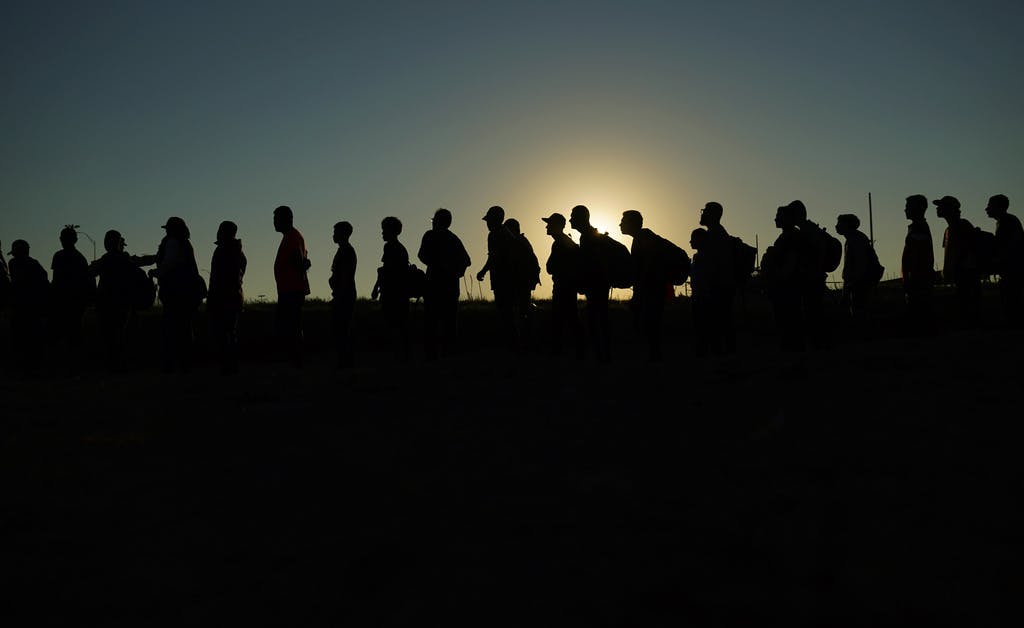Federal Judge Blocks Texas Immigration Law That Would Make Illegal Immigration a State Crime
‘To allow Texas to permanently supersede federal directives on the basis of an invasion would amount to nullification of federal law and authority,’ the judge says.

A federal judge in Texas is temporarily blocking a contentious Texas law seeking to make entry into the state by migrants illegally crossing the U.S.-Mexico border a state crime.
The order comes as immigration is shaping up to be a top issue in the upcoming presidential election, and both President Trump and President Biden are at the southern border on Thursday.
Texas’ Senate Bill 4 would allow police to arrest migrants and state judges to order their deportation, and it was set to go into effect on Tuesday. It is one of multiple battles between Texas and the Biden administration, as Governor Abbott says Texas is being invaded by migrants and has the sovereign right to defend itself in the absence of the federal government enforcing border security.
The Biden administration has argued that entry and removal of noncitizens is an issue that is strictly within the federal government’s purview, citing the Supreme Court ruling in Arizona v. United States in 2012.
On Thursday, a senior federal district judge appointed by President Reagan, David Ezra, expressed concerns that Texas’ law was unconstitutional.
The order halting Texas’ law cites the Supremacy Clause of the Constitution and Supreme Court precedent that affirms “that states may not exercise immigration enforcement power except as authorized by the federal government.” Texas’ SB 4 also conflicts with federal immigration law to the “detriment of the United States’ foreign relations and treaty obligations,” the order adds.
The judge also expressed skepticism of Mr. Abbott’s invasion claims.
“Surges in immigration do not constitute an ‘invasion’ within the
meaning of the Constitution, nor is Texas engaging in war by enforcing SB 4,” the judge notes. “To allow Texas to permanently supersede federal directives on the basis of an invasion would amount to nullification of federal law and authority — a notion that is antithetical to the Constitution and has been unequivocally rejected by federal courts since the Civil War.”
Mr. Abbott said on Thursday that the decision was expected. He is promising to appeal it and says the case will go to the Supreme Court.
“Texas has the constitutional right to defend itself because of President Biden’s ongoing failure to fulfill his duty,” he wrote on X after the order halting SB 4. “We will not back down in our fight to protect Texas.”
Texas has transported more than 104,000 migrants to sanctuary cities including New York, Chicago, and Denver. Mr. Abbott has repeatedly promised to fight illegal immigration through multiple tactics — including adding razor wire barriers, deploying the National Guard, and building a wall at the border — and says he will use every tool at his disposal, as the Sun has reported.
Federal data obtained by CBS this month show that migrant crossings into Texas have plummeted to the single digits in some areas from thousands of daily crossings, as the National Guard fortified many areas of the border. Migrants are increasingly heading to Arizona and California where there are accessible border gaps, and crossings have surged in those states, data show.
Texas’ law has faced legal and public backlash, especially from immigration advocacy groups who say it’s a waste of taxpayer money and will harm minorities, as the Sun has reported.
Yet, some legal observers have previously told the Sun that SB 4 is constitutional and that the federal government only has exclusive authority over making citizens, not all immigration matters.
“The reality is that states retain plenary powers over all persons, not just citizens, within their jurisdiction under the Tenth Amendment,” the Texas Public Policy Foundation chief of intelligence and research, Joshua Treviño, told the Sun when the law was initially being considered in October.
The Supreme Court in the Arizona case “essentially for the first time in American history completely rejected the states from anything having to do with the adjudication of legal status within borders,” he added.

